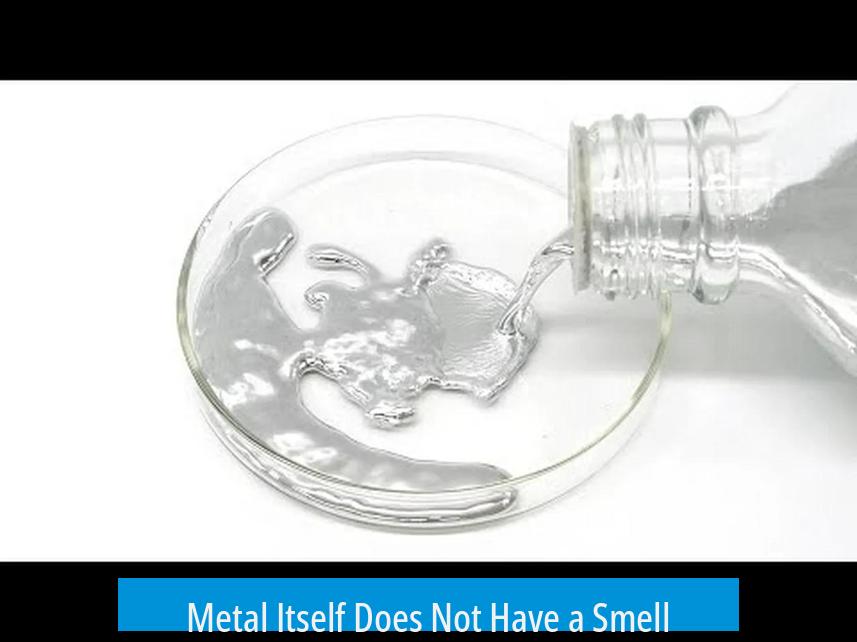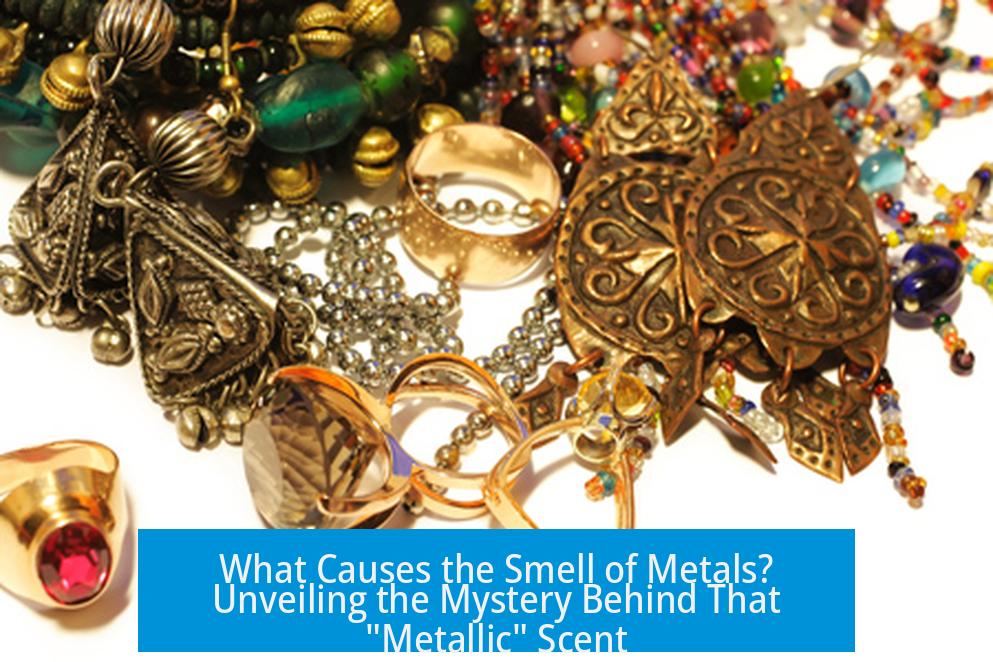What Causes the Smell of Metals?

The characteristic smell we associate with metals, such as iron or copper, does not come from the metals themselves. Instead, this odor originates from chemical reactions involving our skin and metal ions released during contact. When metal touches the skin, a series of reactions produce volatile organic compounds responsible for the familiar metallic scent.
Scientific Explanation of Metallic Odor
The typical metallic smell arises when ferrous ions (Fe2+) form due to sweat-mediated corrosion of iron. These ions react with peroxides naturally present on the skin, producing volatile carbonyl compounds such as aldehydes and ketones. These organic compounds evaporate quickly, releasing the recognizable “musty” or metallic odor.
This reaction explains why bare metal objects themselves lack inherent smell. The metallic scent emerges only after skin contact triggers chemical transformations involving metal ions and skin secretions.
How Different Metals Produce Different Smells
Various metals catalyze different reactions upon contact with the skin’s organic matter. For example, iron, copper, tin, and indium each facilitate unique reactions, generating distinct mixtures of volatile compounds. This diversity produces a range of metallic odors rather than one uniform smell.
- Iron: Produces carbonyl compounds via sweat corrosion.
- Copper: Often associated with a bitter taste due to copper salts and oxides.
- Tin and Indium: Have similar but distinct odors compared to iron and copper.
Role of Skin Secretions and Organic Waste
Sweat and other skin secretions provide organic molecules essential to this process. The metal ions interact mainly with these components, especially peroxides on the skin, leading to the creation of volatile compounds. Without such organic substances, the metallic odor typically does not develop.
Metal Itself Does Not Have a Smell

Experimental studies, including video demonstrations, confirm that pure metals do not emit odor on their own. The familiar metallic scent arises solely from the interplay between metal ions, sweat, and skin chemistry.
This understanding resolves common misconceptions about metal odors, showing the smell is a bio-chemical reaction product, not a property of the bulk metal.
Taste Versus Smell: The Role of Metal Salts and Oxides
In terms of taste, pure metals generally lack flavor. However, metal salts or oxides formed from metals in contact with moisture can impart tastes. For instance, copper salts like copper sulfate produce a bitter taste resembling that of copper pennies.
Stainless steel typically exhibits no taste, likely due to its resistance to corrosion and limited release of metal ions or oxides.
Other Observations Related to Metallic Smells
- Some individuals show a slight metallic smell, possibly linked to personal skin chemistry or environmental factors.
- Hypotheses suggest mold or minerals might produce metallic-like odors, but these are less directly connected to metal contact.
- Minerals containing elements such as arsenic may have distinct odors (e.g., garlic-like), unrelated to typical metallic smells from metals like iron.
Summary of Key Points
- Metallic odor results from volatile organic compounds formed when metal ions react with skin peroxides and sweat.
- Pure metals do not release odor; the smell is a product of skin-metal chemical reactions.
- Different metals catalyze distinct reactions, producing varied metallic smells.
- Taste associated with metals generally derives from metal salts or oxides, not the pure metal.
- Skin secretions and organic compounds are crucial to generating the characteristic metallic smell.
What Causes the Smell of Metals? Unveiling the Mystery Behind That “Metallic” Scent

Is the smell of metal really from the metal itself? The short answer is: no, the metallic smell you notice after touching metals isn’t the metal’s own scent. That familiar “metallic” odor actually comes from a neat bit of chemistry happening on your skin.
Let’s dive into the surprisingly scientific world behind the smell of metals. Spoiler alert: it’s all about your skin’s chemistry and some clever reactions happening right at the surface.
So, What Exactly Causes That Metallic Smell?
Here’s the lowdown: When you touch a metal like iron, something fascinating happens. Your sweat reacts with the metal’s surface, causing tiny amounts of the iron to corrode (think of it like rust forming, just at a microscopic level).
The magic part? This corrosion releases ferrous ions (Fe2+). These ions then meet with peroxides in your skin — naturally occurring compounds that exist as skin oils and sweat components.
The result? A chemical reaction produces volatile carbonyl compounds, which include aldehydes and ketones. These molecules are volatile, meaning they evaporate and waft into your nose, giving you that “metallic” scent.
“The typical ‘musty’ metallic odor of iron metal touching skin (epidermis) is caused by volatile carbonyl compounds (aldehydes, ketones) produced through the reaction of skin peroxides with ferrous ions (Fe2+) that are formed in the sweat-mediated corrosion of iron.” — Source: Angewandte Chemie International Edition
In other words, it’s not the metal itself making the smell. It’s a simple but very specific skin-metal interaction. Your body chemistry and the corrosion of the metal combine forces like a small chemistry lab on your fingertips.
Different Metals, Different Smells
You might have noticed that different metals seem to have different odors. Iron smells distinct from copper, and tin or indium have their own unique metallic scent.
This is because different metals catalyze different chemical reactions when they touch your skin. They all react with your body’s natural secretions but produce unique sets of volatile compounds. So, the “metal smell” varies depending on the metal you’re holding.
One metal doesn’t have a universal scent; it’s a palette of smells shaped by nature and your skin chemistry. For instance, copper and iron create very different smell profiles.
Metal-Catalyzed Chemical Reactions on Skin: The Real Smell Makers
- Sweat and skin secretions contain organic compounds and peroxides.
- When these meet metallic ions (like Fe2+ from iron), reactions create aldehydes, ketones, and other carbonyl compounds.
- These compounds are volatile — they evaporate and tickle your nose.
This insight is backed by scientific experiments showing that the metal itself doesn’t produce a scent. For example, popular science YouTuber NileRed demonstrated that pure metals don’t smell. It’s only when skin secretions mix with the metal’s corrosion products that the scent appears.
Is the Taste of Metals Also Linked to This Chemistry?

Similar to smell, the taste that metals can produce—like the bitter feeling of copper pennies or the lack of taste with stainless steel—comes from metal salts or oxides, not the pure metal itself. Copper compounds, such as copper sulfate, produce a bitter taste. Stainless steel, on the other hand, barely releases such compounds, so it tastes neutral.
So next time you taste something metallic, remember it’s likely a metal salt or oxide reacting in your mouth rather than the metal itself.
Beyond Skin Contact: Metallic Smells and the Body
Handling metals is the most straightforward cause of that metallic odor on the skin. But metallic smells can come up in other surprising ways. Have you ever noticed a strange metallic smell on your breath? That’s often linked to trace metals like iron or zinc naturally present in your sweat or from underlying health conditions.
For example, iron supplements can lead to an overload in the body, causing a persistent metallic taste or smell. Intense workouts, where excessive protein breakdown happens, can also cause ammonia to be released through sweat, contributing to similar odors.
Some people even report a faint metallic scent without any metal around. This phenomenon, called phantosmia, or “phantom odors,” might be linked to neurological conditions like cancer, so it’s worth consulting a doctor if it happens often.
Any Other Theories Out There?
Funny enough, some speculate that the metallic smell could sometimes be mistaken for mold odors or mineral smells (like arsenic’s garlic-like scent). While interesting, these are less common and more anecdotal than the well-researched chemistry between skin and metal ions.
Summary — What Should You Take Away?
- Metal itself has no scent. The “metallic smell” is a reaction product of sweat, skin oils, and metal ions formed when metal corrodes in contact with skin.
- Different metals produce different smells because each catalyzes distinct chemical reactions.
- The volatile compounds responsible are carbonyl compounds like aldehydes and ketones.
- Taste sensations from metals often stem from metal oxides and salts, not the metals themselves.
- Metallic smells on breath or body can be influenced by health, diet, or supplements.
So the next time you hold a rusty old tool or clutch your copper coin, remember: the smell isn’t the metal whining for attention, but your own chemistry throwing a tiny smoky party on your fingertips. And now you’re in on the secret.
Bonus Practical Tip:
If you want to get rid of that metallic smell after handling metals, try washing hands with soap and water. The volatile compounds tend to wash away, breaking up the reaction mixture. Or, for a fun experiment, touch different metals and compare how their unique metallic odors differ!
Isn’t chemistry much cooler when it’s happening on your skin? And the facts show it’s your skin turning metal into a scented symphony — science style.
Why does metal only smell after touching it?
The smell appears when metal and skin interact. Sweat and skin peroxides react with metal ions, especially iron ions, producing volatile compounds that create the metallic odor.
Do different metals cause different metallic smells?
Yes. Different metals catalyze varied chemical reactions on the skin. For example, iron, copper, tin, and indium each produce distinct metallic odors through unique skin-metal reactions.
Does the metal itself have a smell?
No. Metals do not have an inherent scent. The metallic smell comes from chemical reactions between metal ions formed on the skin and organic compounds in sweat and skin secretions.
What causes the bitter taste sometimes associated with metals?
The bitter taste often comes from metal salts or oxides, not from the pure metal. Copper salts like copper sulfate can cause this bitter taste, unlike pure metals such as stainless steel.
Can mold cause a metallic smell?
Some suggest mold might cause metallic-like smells, but this is not a confirmed cause. The main metallic smell comes from chemical reactions involving metals and skin, not mold growth.





Leave a Comment